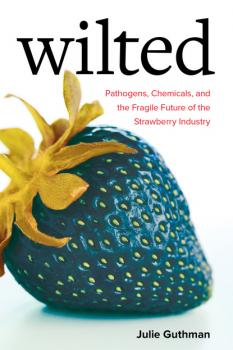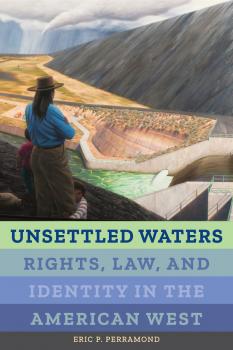ТОП просматриваемых книг сайта:
Critical Environments: Nature, Science, and Politics
Скачать книги из серии Critical Environments: Nature, Science, and PoliticsАннотация
Strawberries are big business in California. They are the sixth-highest-grossing crop in the state, which produces 88 percent of the nation’s favorite berry. Yet the industry is often criticized for its backbreaking labor conditions and dependence on highly toxic soil fumigants used to control fungal pathogens and other soilborne pests.<BR /><BR /> In <I>Wilted</I>, Julie Guthman tells the story of how the strawberry industry came to rely on soil fumigants, and how that reliance reverberated throughout the rest of the fruit’s production system. The particular conditions of plants, soils, chemicals, climate, and laboring bodies that once made strawberry production so lucrative in the Golden State have now changed and become a set of related threats that jeopardize the future of the industry.
Аннотация
Destination Anthropocene documents the emergence of new travel imaginaries forged at the intersection of the natural sciences and the tourism industry in a Caribbean archipelago. Known to travelers as a paradise of sun, sand, and sea, The Bahamas is rebranding itself in response to the rising threat of global environmental change, including climate change. In her imaginative new book, Amelia Moore explores an experimental form of tourism developed in the name of sustainability, one that is slowly changing the way both tourists and Bahamians come to know themselves and relate to island worlds. 
Аннотация
Life without Lead examines the social, political, and environmental dimensions of a devastating lead poisoning epidemic. Drawing from a political ecology of health perspective, the book situates the Uruguayan lead contamination crisis in relation to neoliberal reform, globalization, and the resurgence of the political Left in Latin America. The author traces the rise of an environmental social justice movement, and the local and transnational circulation of environmental ideologies and contested science. Through fine-grained ethnographic analysis, this book shows how combating contamination intersected with class politics, explores the relationship of lead poisoning to poverty, and debates the best way to identify and manage an unprecedented local environmental health problem.
Аннотация
In recent years, a catastrophic global bleaching event devastated many of the world’s precious coral reefs. Working on the front lines of ruin, today’s coral scientists are struggling to save these important coral reef ecosystems from the imminent threats of rapidly warming, acidifying, and polluted oceans. <I>Coral Whisperers</I> captures a critical moment in the history of coral reef science. Gleaning insights from over one hundred interviews with leading scientists and conservation managers, Irus Braverman documents a community caught in an existential crisis and alternating between despair and hope. In this important new book, corals emerge not only as signs and measures of environmental catastrophe, but also as catalysts for action.<BR /> 
Аннотация
The United States government has spent billions of dollars to prepare the nation for bioterrorism despite the extremely rare occurrence of biological attacks in modern American history. <I>Germ Wars</I> argues that bioterrorism has emerged as a prominent fear in the modern age, arising with the production of new forms of microbial nature and the changing practices of warfare. In the last century, revolutions in biological science have made visible a vast microscopic world, and in this same era we have watched the rise of a global war on terror.<BR />  <BR /><I>Germ Wars</I> demonstrates that these movements did not occur separately but are instead deeply entwined—new scientific knowledge of microbes makes possible new mechanisms of war. Whether to eliminate disease or create weapons, the work to harness and control germs and the history of these endeavors provide an important opportunity for investigating how biological natures shape modern life. <I>Germ Wars</I> aims to convince students and scholars as well as policymakers and activists that the ways in which bioterrorism has been produced have consequences for how people live in this world of unspecifiable risks.
Flame and Fortune in the American West - Gregory L. Simon
Critical Environments: Nature, Science, and PoliticsАннотация
Flame and Fortune in the American West creatively and meticulously investigates the ongoing politics, folly, and avarice shaping the production of increasingly widespread yet dangerous suburban and exurban landscapes. The 1991 Oakland Hills Tunnel Fire is used as a starting point to better understand these complex social-environmental processes. The Tunnel Fire is the most destructive fire—in terms of structures lost—in California history. More than 3,000 residential structures burned and 25 lives were lost. Although this fire occurred in Oakland and Berkeley, others like it sear through landscapes in California and the American West that have experienced urban growth and development within areas historically prone to fire.   Simon skillfully blends techniques from environmental history, political ecology, and science studies to closely examine the Tunnel Fire within a broader historical and spatial context of regional economic development and natural-resource management, such as the widespread planting of eucalyptus trees as an exotic lure for homeowners and the creation of hillside neighborhoods for tax revenue—decisions that produced communities with increased vulnerability to fire. Simon demonstrates how in Oakland a drive for affluence led to a state of vulnerability for rich and poor alike that has only been exacerbated by the rebuilding of neighborhoods after the fire. Despite these troubling trends, Flame and Fortune in the American West illustrates how many popular and scientific debates on fire limit the scope and efficacy of policy responses.    These risky yet profitable developments (what the author refers to as the Incendiary), as well as proposed strategies for challenging them, are discussed in the context of urbanizing areas around the American West and hold global applicability within hazard-prone areas.
Аннотация
In the American West, water adjudication lawsuits are adversarial, expensive, and lengthy. <I>Unsettled Waters</I> is the first detailed study of water adjudications in New Mexico. The state envisioned adjudication as a straightforward accounting of water rights as private property. However, adjudication resurfaced tensions and created conflicts among water sovereigns at multiple scales. Based on more than ten years of fieldwork, this book tells a fascinating story of resistance involving communal water cultures, Native rights and cleaved identities, clashing experts, and unintended outcomes. Whether the state can alter adjudications to meet the water demands in the twenty-first century will have serious consequences.







